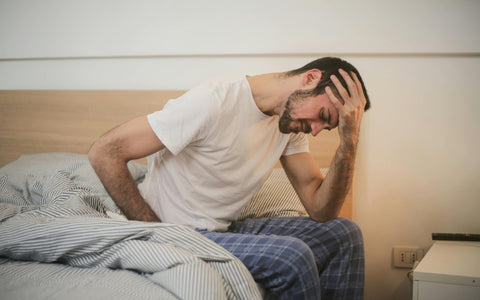Feeling ‘tired all the time’ is a popular complaint & it’s fair to say if you’re feeling overly tired, you’re not alone. According to the Royal College of Psychiatrists, one in 5 people feels unusually tired, with one in 10 suffering from prolonged fatigue.
Tiredness & fatigue can have a real impact on your life, it can make you less motivated at work, affect your relationships with those around you & harm your overall quality of life.
There are many potential causes for feeling tired & fatigued. It might be back-to-work blues, a restless night, or being constantly rushed off our feet that’s making us want to hit the pillow as soon as we get home.
So what do you do when your levels of energy feel constantly depleted? It’s easy to drink more coffee, eat sugary snacks or take an afternoon nap. But those quick fixes will not help you in the long run.
So in this post, we’re going to point out the real reasons many people suffer from tiredness and how the right vitamins and minerals can help to alleviate these issues & improve your quality of life.
Why do we feel tired?

There are many possible reasons that you’re feeling tired and fatigued. One of the possibilities is that you’re deficient in some vitamins and minerals.
If these deficiencies are left unchecked, it’s not only going to make it hard to get out of bed in the morning, but it could also lead to long-term health consequences. For example, if Vitamin B12 deficiency goes on long enough, it can cause permanent damage to the brain and the spinal cord, affecting your ability to move, talk and think clearly.
It’s extremely important to regularly check for vitamin deficiencies and understand which food and supplements will help you maintain a healthy balance.
Our recommended vitamins for tiredness
Health experts claim that a healthy balanced diet can be achieved just by eating the right foods. This includes regular meals packed with fruit and vegetables and foods high in healthy fats, fibre and protein.
But hand-on-heart, how many of us can truthfully say that we eat a healthy balanced diet 100% of the time? Most of us rely on quick-fix foods, which are often heavily processed, high in sugar and contain unhealthy fats.
A diet like this can increase tiredness by not giving your body the raw materials it needs to thrive, and over time, if you lack the nutrients your cells need to produce energy, you will inevitably feel tired.
This is where vitamin supplements may be beneficial to you, as they can give your body the extra push it needs to help maintain your energy levels.
Vitamin D
Vitamin D, the ‘sunshine’ vitamin, is a hormone produced in the skin in response to sunlight.
Having insufficient levels of vitamin D can negatively impact sleep and hormones linked to mood, with the overall effect of making us feel tired.
What’s more, having adequate levels of vitamin D has been shown to positively influence the function of mitochondria - tiny energy powerhouses in our cells.
Recommended daily allowance
Adults need to consume 10 micrograms of Vitamin D per day.
Symptoms of having low levels of vitamin D
● Tiredness and fatigue
● Bone and muscle pain
● Frequent illnesses or infections
● Anxiety and depression
● and full-blown deficiency can lead to the bone disease rickets
How to get enough Vitamin D

The best way to increase vitamin D is from sunlight, however, due to the position of the UK on the earth and our climate, it’s difficult to get enough.
Food sources include fatty fish - salmon, mackerel and sardines. Dairy products include eggs and milk, and for veggies and vegans, mushrooms are your best bet for extra Vitamin D.
It’s almost impossible to get enough Vit D from food and drink alone, and during the covid pandemic, government advice to supplement October-April was increased to year-round supplementation.
At Get More Vits, we have several products to help you keep your Vit D levels up, including our best-selling Mango & Passion fruit drink, effervescent tablets, regular tablets and spray.
B Vitamins
B vitamins work synergistically as a ‘complex’ to release energy from food. During the times when you’re highly stressed, your body is in even greater demand for B vitamins.
Recommended daily allowance
● B1/Thiamin: 1mg for men, 0.8mg for women
● B2/Riboflavin: 1.3mg for men, 1.1mg for women
● B3/Niacin: 16.5mg for men, 13.2mg for women
● B5/Pantothenic acid: No amount has been set in the UK
● B6: 1.4mg a day for men, 1.2mg a day for women
● B7/Biotin: 30mcg a day for men and women
● B9/Folate acid: 200mcg for men and women
● B9: 200mcg for men and women, 400mcg up to 12 weeks pregnant
● B12: 1.5mcg for men and women
Symptoms of having low levels of B vitamins
● Tiredness
● A lack of energy
● Depression
How to get enough B Vitamins

B vitamins themselves don’t increase your energy. They work with other co-factors to convert calories from carbohydrates into energy (and, to a lesser extent, protein and fat).
Foods rich in B vitamins include whole grains, green leafy veg, beans, nuts, seeds, fruit and vegetables.
However, B12, which is particularly important for the nervous system, is only found in meat, fish, eggs, dairy and some fortified soy products, so vegans are advised to supplement. At Get More Vits you can get your fix of B vits in our Apple and Raspberry drink, supplements, spray and our Multivits products.
Vitamin C
Vitamin C’s impact on our energy levels comes from its role in the production of stress hormones. Our adrenal glands contain the highest concentration of vitamin C in the body, and the more stressed we are, the more vitamin C is used up.
We also need vitamin C to absorb iron from our food, which is crucial for red blood cell production, helping to carry oxygen around the body. If you’re low, you will definitely feel fatigued.
Many of us in the UK don’t get enough vitamin C as the body can’t produce or store it naturally. Therefore it’s essential that we consume enough vitamin C foods and/or supplements regularly.
Recommended daily allowance
Adults aged 19 to 64 need 40mg of vitamin C daily.
Symptoms of having low levels of B vitamins
● Fatigue and weakness
● Irritability
● Low mood
● Pain in muscles and joins
● Weak bones
● Swollen or bleeding gums
● Easy bruising
● Persistent iron deficiency anemia
How to get enough Vitamin C

Fruit and veg are your number one source of vitamin C, especially berries, citrus fruits and broccoli. Fresh or frozen is best as these will contain the richest form of Vitamin C, compared to foods that have left on the shelf too long.
A good way to incorporate Vitamin C into your daily meals is through smoothies, soups, salads and stir-fries. Just bear in mind, that cooking can reduce the nutritional value of some fruit and vegetables, so try and consume raw foods as well.
We also have a fantastic range of vitamin C products to choose from. Our delicious sparkling orange drinks will give you that extra boost when you’re on the go, and our daily tablets will ensure that you’re always maintaining strong levels of vit C.
Multivitamins
Eating the right foods is key for getting the vitamins and minerals needed to support the everyday body processes required to produce energy and reduce tiredness.
Sadly, our food is simply not the quality that it once was. With soil being depleted, antibiotics and pesticides used in farming and processed foods being sold almost everywhere, it’s sensible to consider taking a wide-spectrum multivitamin to make up for the shortcomings in our daily diet.
Our Multivits tablets and drinks contain a combination of the following key ingredients – vitamin C, vitamin D and B vitamins, which play an important role in supporting energy release in the body and your metabolism.
Our recommended minerals for tiredness
Minerals work synergistically with vitamins to help create the energy our body needs to survive.
Iron
The primary role of iron is to produce red blood cells and transport oxygen around the body. If you don’t have enough, you will not be able to produce enough red blood cells, which can lead to anaemia.
Tiredness and fatigue are the most common symptoms of low iron levels, this is because the body is struggling to get enough oxygen into the blood cells. So if you’re feeling weak, sluggish or unable to focus, then it’s a good idea to check your iron levels with your GP.
Recommended daily allowance
Men over 18 need 8.7mg of iron per day, women aged 19-50 need 14.8mg and women over 50 need 8.7mg.
Symptoms of having low levels of Iron
Symptoms of iron deficiency anaemia can be mild initially and often go unnoticed. But as anaemia worsens, symptoms can include:
● Extreme fatigue
● Pale skin
● Easy bruising
● Brittle nails
● Headaches, dizziness or lightheadedness
● Poor appetite
How to get enough Iron

Most people can get enough iron from liver, red meat, beans, nuts, dried fruit and fortified breakfast cereals.
However, people diagnosed with anaemia will need to take supplements to ensure they are consistently getting enough. Our Multivitamin + Iron tablets contain the recommended daily intake, perfect for maintaining a healthy balance.
Magnesium
Magnesium is something of a wonder mineral, found in every one of our cells and involved in over 300 processes in the body.
The mineral works directly to create energy in the body by activating something called ‘adenosine triphosphate’(ATP) within the body's cells, helping to transform the nutrients consumed in food and supplements into energy.
It comes in many forms, some better absorbed and utilised by the body than others.
The most common types you’ll see on supplements are glycinate – generally, the best absorbed, followed by malate and citrate, which are often prescribed for their laxative properties.
Recommended daily allowance
Men aged between 19 to 64 need 300mg daily, and women aged 19 to 64 need 270mg.
Symptoms of having low levels of magnesium
Because of magnesium’s involvement in cellular health, low levels can cause symptoms of:
● Tiredness
● Fatigue
● A lack of energy
● Mood disorders
● Poor sleep quality
● Sore muscles and joints
● Migraines
How to get enough magnesium

Magnesium is found in green leafy veg, wholegrain, avocados, oily fish, beans, lentils, nuts & seeds and our favourite – dark chocolate!
You can also supplement these foods with our Coconut Electrolyte Tablets, which contain magnesium, as well as vitamins B1, B12, sodium and potassium.
Summary
If you’re always feeling tired or fatigued, instead of putting the kettle on to make a strong coffee or hoping a quick nap will do the trick, a better solution is to get checked for your vitamin and mineral deficiencies at your GP.
You might find out that getting more of these vitamins and minerals will help maintain your energy levels and stay awake for longer periods:
● Vitamin D
● B Vitamins
● Vitamin C
● Multivitamins
● Iron
● Magnesium
This post gives you some great food recommendations to help you consume more of these vitamins and minerals. However, getting the right amounts purely from food is not always easy. Therefore we’re proud to stock a fantastic range of products that will give you that extra boost for maintaining a healthy balance.
Once you’ve started taking more vitamins, you might be wondering how long it’s going to take to start feeling better. So give our other post a read, as this will give you a good idea of what to expect.

